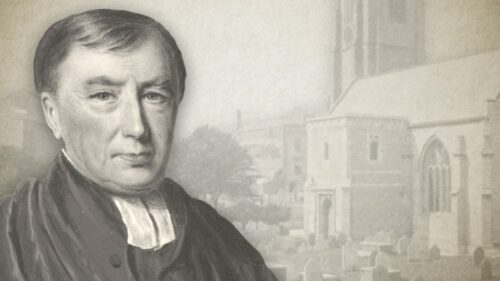
May 12—Morning Devotion
“Then saith he to Thomas, reach hither thy finger, and behold my hands; and reach hither thy hand, and thrust it into my side; and be not faithless, but believing.”—John 20:27
Was Jesus willing to have his wounds searched, than his unbelieving disciple should go unconvinced? Look, then, my soul, at Jesus, and he will grant thee a suitable testimony, to hush all thy remaining doubts, if so be after such manifestations of grace as he hath shewn thee, there be a single doubt left behind. Doth not Jesus, in effect, say, in every renewed ordinance, reach hither thy finger, thrust in thine hand, and the precious blood thou needest shall flow; for the fountain for sin, for uncleanness, for unbelief, and, in short, for every necessity of my people, is still open. Is not this the language of all? Doth unbelief doubt the reality of the thing itself, like Thomas? Doth unbelief tempt the soul to doubt the particular efficacy of it to special cases, such as a man’s own? Doth unbelief suggest the circumstances hopeless from delay, from past neglect, from present unworthiness? In answer to all, Jesus speaks, “reach hither thy finger;” and if a touch will not satisfy thee, thrust thy hand deeply into my side. Here is enough to silence all fears: why are those wounds still open? Wherefore did I appear to my servant John as a lamb that had been slain, but to convince, by so palpable a testimony, that I am the same yesterday, to-day, and for ever? Oh for grace to return the grateful answer to Jesus, “my Lord, and my God!” My soul, now thou art commanded, this do. Put forth thine hand, and leave every other consequence with Jesus. While Jesus thus gives himself to thee, my soul, do thou make a complete surrender of thyself to him; for this is the very exercise of faith that Jesus is come after, and therefore let him not go away until he hath taken thine whole affections with him, as thy Lord and thy God.
Robert Hawker (1753-1827) was an Anglican (High-Calvinist) preacher who served as Vicar of Charles Church, Plymouth. John Hazelton wrote of him:
“The prominent features…in Robert Hawker's testimony…was the Person of Christ….Dr. Hawker delighted to speak of his Lord as "My most glorious Christ.” What anxious heart but finds at times in the perusal of the doctor's writings a measure of relief, a softening, and a mellowing? an almost imperceptible yet secret and constraining power in leading out of self and off from the misery and bondage of the flesh into a contemplation of the Person and preciousness of Christ as "the chiefest among ten thousand and the altogether lovely." Christ and Him crucified was emphatically the burden of his song and the keynote of his ministry. He preached his last sermon in Charles Church on March 18th, 1827, and on April 6th he died, after being six years curate and forty-three years vicar of the parish. On the last day of his life he repeated a part of Ephesians 1, from the 6th to the 12th verses, and as he proceeded he enlarged on the verses, but dwelt more fully on these words: "To the praise of His glory Who first trusted in Christ." He paused and asked, "Who first trusted in Christ?" And then made this answer: "It was God the Father Who first trusted in Christ."
Robert Hawker on the Biblical Covenants (Complete)
Robert Hawker's Poor Man's Morning Portions





